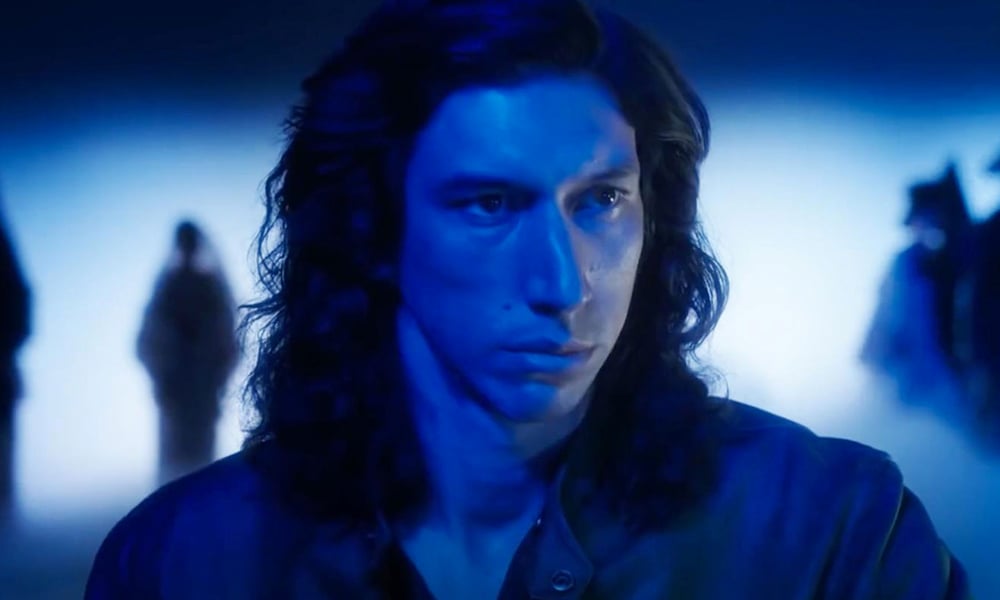2020 was a year without Adam Driver. So 2021 has made up for the privation with Adam Driver times three: Leos Carax’s Annette, Ridley Scott’s The Last Duel, and because 2020 was also a year without Ridley Scott, Ridley Scott’s House of Gucci. (20th Century Studios originally had The Last Duel slotted for 12/25/20, but COVID delayed production and forced a change in date to 10/15/21.) This isn’t the most Adam Driver performances in a single year; that distinction belongs to 2019, where he showed up in The Report, The Dead Don’t Die, Marriage Story, and Star Wars: The Rise of Skywalker. But having gone so long without a Driver fix, his 2021 trio feels celebratory – at least for us.
Driver famously hates engaging with or even talking about his own performances. For a few years in the early 2010s, this wasn’t an issue. He had yet to introduce himself to a wider audience with his breakout role in Lena Dunham’s HBO series Girls, where he played Adam Sackler, part-time carpenter, part-time actor, full-time unstable basket case. In the 5 years the show ran on HBO, Driver managed to score a few small-time gigs with big-name directors ranging from the brothers Coen (Inside Llewyn Davis), Steven Spielberg (Lincoln), and Noah Baumbach (Frances Ha), with whom he has collaborated three times since in While We’re Young, The Meyerowitz Stories, and Marriage Story. (They will reteam next year with White Noise.) In between these roles, other big-name directors – Spike Lee, Steven Soderbergh, Martin Scorsese, Jim Jarmusch, and most of all J.J. Abrams – have hired Driver for even bigger roles, and now here he is in 2021, fully formed into one of his generation’s most prominent actors. The one-two-three of Annette, The Last Duel, and House of Gucci proves it and puts a spotlight on him as the man of the year.
Granted, a press cycle that started in August and will continue through December (and if awards season goes in his favor, beyond) sounds like compressed hell for an actor who shies from his work. But after missing that cycle due to circumstances outside of his control, Driver may welcome the chance to promote his films and walk down red carpets once again, particularly because each of these films vary so wildly from the others: A meta-musical drama (Annette), a brutal period drama (The Last Duel), and a true-crime biopic (House of Gucci). Together, they demand that he show and even expand on his range.
None of these films make the same ask of him. The Last Duel requires that he play to his charms while weaponizing them. House of Gucci asks him to downplay himself next to his more ostentatious costars. Annette lets him essentially play the kind of character that Adam Sackler would have liked to have played on stage. Carax’s film is frustrating that way: Movie stars carry their own mythos with them from one role to the next, and that mythos can surface in their movies unexpectedly to the movies’ benefit. In the case of Annette, Driver is a liability more than an asset. It’s impossible to watch him step into the part of an insult comic, Henry McHenry, and indulge in his self-obsessive faux-philosophy as his audiences do. It’s impossible to watch Driver without thinking of Sackler.
Henry is a monumentally grating character. Because he’s played by Driver, he becomes off-putting to Annette’s detriment. Henry is unlikeable. We’re not really supposed to be in his corner. But he’s unlikeable to a degree where Driver’s performance is unlikeable, in the sense that Driver and Henry together make Annette distressing to watch. Yes, it’s partly Carax’s intention. Henry is the film’s antagonist. He becomes jealous of his wife, Ann (Marion Cotillard), as her opera career takes off, his comedy career dwindles, and his role in their marriage is to stay at home with their baby daughter, Annette (brought to life on screen as a puppet). Eventually, Ann dies in a maritime accident that’s entirely Henry’s fault. He exploits Annette’s singing voice, which sounds exactly like Ann’s, for personal gain. He murders Ann’s old accompanist (Simon Helberg) in cold blood when it’s revealed that he is Annette’s true father.
Everyone likes a charismatic villain, and Driver is certainly that. But maybe casting him as a performer was a bad idea given that the most important character of his career was, at his heart, also a performer. In contrast, Driver makes a more convincing charismatic villain in The Last Duel, where he plays Jacques Le Gris, a French squire loyal to Count Pierre d’Alençon (Ben Affleck). Le Gris, a real historical figure, is accused of rape by the noblewoman Marguerite de Carrouges (Jodie Comer), wife to Le Gris’ fellow squire Jean de Carrouges (Matt Damon). The Last Duel is split into 3 chapters. The assault is shown in 2 of them, one told from Le Gris’ perspective, the other from Marguerite’s. In both, Le Gris behaves as if the sex was consensual and mutual, as if Marguerite was as much the initiator as he.
Annette’s collision between star and character actually helps underscore Ridley Scott’s stroke of genius in casting Driver as The Last Duel’s heavy. Driver is a vibrant, alluring actor in the right hands, and, yes, charming in any hands at all. Where Annette mistakes Driver’s persona as a replacement for character, The Last Duel understands that Driver has real magnetism: It’s almost indescribable, but one can’t help being drawn in by him, idiosyncratic looks and all.
Driver looks as if God put him together using spare parts scattered around his workshop at the end of a long, busy day. “Good enough” if “good enough” was shaped into a man – strong brow, oblong face, broad lips, hooked nose, hooded eyes. The combination works, though. Frenchwomen at court titter and whisper over how handsome he is in The Last Duel, and though Scott may not mean to, these one-off lines acknowledge pop culture’s embrace of his appearance and status as a hunky sex symbol. That’s a pretty impressive journey to take for a man who made his name playing a gangly 20-something emotional wreck. Adam Driver is desirable; Adam Sackler is undateable.
Quietly sitting opposite Annette and The Last Duel is House of Gucci, where Driver does what his fellow cast members – Lady Gaga and Jared Leto especially – refuse to: Actually act. What’s interesting about Driver’s casting as Gucci fashion scion Maurizio Gucci is the symmetry the role shares with The Last Duel. Gucci isn’t a scumbag rapist like Le Gris, but he is doomed to die from the start of the film. His fate is decided by a woman, too, though Patrizia Reggiani (Gaga) takes revenge on Maurizio for his greedy, deceitful business dealings and rank stupidity. Besides, Marguerite isn’t out for revenge. She’s out for justice.
It’s a minor but important distinction that shapes Driver’s performances in both movies. For The Last Duel, the pursuit of justice means humanizing Le Gris, and not in terms of making him sympathetic or relatable. Le Gris has to feel like a real, complex figure, one who genuinely believes Marguerite wanted him as much as he wanted her, and that her pleading had more to do with honor than lack of desire. Driver has a little more latitude with Maurizio, partly because House of Gucci’s tone falls on the Ryan Murphy scale and not the Game of Thrones scale, but mostly because Leto’s Paolo Gucci is more of a shameless cartoon character than Charles Martinet’s Mario.
Driver’s turn in House of Gucci is (somehow) less flashy than his turn in Annette and less complex than his turn in The Last Duel. It’s also the least Adam Driver-y. Whether Annette or The Last Duel is the best example of Driver’s preferences as an actor comes down to the eye of the beholder; he loves working with the greats, but in the case of these movies, the greats, Carax and Scott, have very different ideas about his skill set. In Annette, Driver swings big. In The Last Duel, he aims for refinement. Who would have thought we’d all wind up watching the gawky dude from Girls strive for self-improvement from one role to the next in real-time?
In the end, it’s a net gain that 2020 wiped his slate clean. He’s one of the brightest stars of the day; his COVID-mandated hiatus from the screen in 2020 coupled with his steady stream of work in 2021 remind us what we were missing last year. Seeing Annette, The Last Duel, and House of Gucci paired together in the same release year lets us better appreciate how far he’s come since the early 2010s and how much further he’s willing to push himself.





